Battery maker Johnson Controls is gambling on the stop-start automotive market keeping the lead-acid industry buoyant for the next 20 years.
Joe Walicki, president of power solutions at the US firm, is forecasting that 50% of North America and China, and 60% of Europe’s vehicles will be stop-start by 2020.
He is so sure that Johnson recently earmarked $780million of lead battery investments into the company’s global manufacturing strategy.
That investment is set to include $245million at its existing lead-based battery plants in Mexico, Winston-Salem and St. Joseph, Missouri, and around $200million in a new plant in China.
“All of our modeling shows that AGM batteries will be around for a long time out to 2035 or 2040. As you introduce low-voltage solutions AGM batteries will be most frequently paired with these technologies,” Walicki told Automotive News.
“Even if you listen to some of the biggest proponents, they will tell you that EVs and plug-in hybrids will account for only 4 to 6% of the market in 2025.
That’s because Walicki is gambling on the technology seamlessly fitting into customer’s existing vehicles because the batteries don’t have to be charged via a power outlet.
JCI appear to be focused on lead, but is hedging its bets. It runs a lithium-ion plant in Michigan, although its North American plant is only running at half its 300MW capacity.
The company currently sells its lithium-ion batteries to Jaguar Land Rover and Mercedes.
Walicki said: “If you look at that market, it’s just beginning to develop. And it’s not like you can make a lithium-ion battery pack that you can drop into a bunch of different vehicles en masse.
You have a difficult time scaling up production because you have a unique battery pack for each automaker.”
The comments were taken from an interview published in Automotive News on July 4












